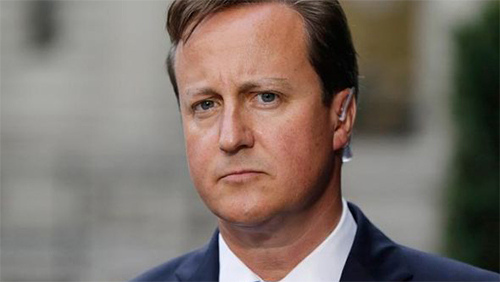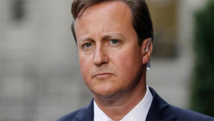The British media have dubbed the "civil war" the fuzzbuzz happening in the government of David Cameron and the Conservative Party. According to the newspaper The Daily Telegraph, referring to an unnamed source in the government, it came to the fact that Prime Minister is not greeting the eurosceptics-ministers, when confronted with them in the corridors, and is even "trying not to look at them." "I do not think he realizes how much damage he does to the party. Whatever will happen in the referendum, Cameron creates a split so deep that it will be extremely difficult to overcome." - said the newspaper's source. The prime minister's office later denied this information.
Recall that in late February in Brussels, David Cameron wheedled "special rights" for the UK out of the EU. In particular, the country will be able to distance itself from further European integration and problems with eurocurrency, as well as to determine the rules of social benefits for migrant workers from other EU countries. Having the deal sealed, Prime Minister Cameron promised "with all my heart and with all my strength" to campaign for the preservation of EU membership.
However, not all members of the government agreed with their leader. Campaign in support of the "divorce" with the European Union is headed by Justice Minister Michael Gove. He was joined by Heads of the Ministry of Labour, the Ministry of Culture, and the Minister of State for Northern Ireland, as well as by the Mayor of London Boris Johnson. The range of their arguments is wide: from the EU's inability to effectively control their external borders to the excessive costs of the Brussels bureaucracy.
David Cameron's companions focus on the economy. In particular, they refer to the data published on March 21 by research group CBI report, whose authors calculated that the UK's withdrawal from the EU would entail a loss of 5% of GDP and massive job cuts (up to 995 thousand people.). Last week, Energy Minister Amber Rudd warned about another consequence - a sharp rise in the cost of gas and electricity to UK consumers. It will happen, according to the minister, because of the cessation of the foreign investment's flow in the country's energy system.
In recent days, the future of the national health system was in the limelight of the discussion. Head of Britain's Ministry of Health Jeremy Hunt warned that 'Brexit' would lead to reduced costs in the system, fall of service standards and an outflow of foreign experts. In response, the leader of the campaign "Vote Leave," Matthew Elliott, called the minister an "alarmist", noting that the health care system already is in a financial crisis, for which lord Hunt is to blame. "We can stop the waste of money for the European bureaucrats and invest in health care instead ," - Matthew Elliott explained his position.
The split has arisen and is developing not only in ruling political circles. It became known yesterday that about 250 British businessmen and financiers were in favor of 'Brexit'. According to newspaper The Times, they are going to form a business council, headed by the former head of the British Chamber of Commerce John Longworth. However, the opposite camp also maintains the ground. In February, leaders of some of the largest companies of the country (in particular, EasyJet, Shell, BAE Systems) have signed a letter in support of EU membership. In mid-March, they were supported by CBI group report . According to the results of CBI members' survey (the group comprises about a third of all private companies operating in the country ), it turned out that 80% of them want to stay in the European Union.
Now, it's too early to predict the outcome of the popular vote to be held on 23 June. According to a recent survey of the ICM, 43% support the country's exit from the EU's, and 41% are against. The final result depends on what position will take those who have not decided yet.
source: telegraph.co.uk, bbc.co.uk
Recall that in late February in Brussels, David Cameron wheedled "special rights" for the UK out of the EU. In particular, the country will be able to distance itself from further European integration and problems with eurocurrency, as well as to determine the rules of social benefits for migrant workers from other EU countries. Having the deal sealed, Prime Minister Cameron promised "with all my heart and with all my strength" to campaign for the preservation of EU membership.
However, not all members of the government agreed with their leader. Campaign in support of the "divorce" with the European Union is headed by Justice Minister Michael Gove. He was joined by Heads of the Ministry of Labour, the Ministry of Culture, and the Minister of State for Northern Ireland, as well as by the Mayor of London Boris Johnson. The range of their arguments is wide: from the EU's inability to effectively control their external borders to the excessive costs of the Brussels bureaucracy.
David Cameron's companions focus on the economy. In particular, they refer to the data published on March 21 by research group CBI report, whose authors calculated that the UK's withdrawal from the EU would entail a loss of 5% of GDP and massive job cuts (up to 995 thousand people.). Last week, Energy Minister Amber Rudd warned about another consequence - a sharp rise in the cost of gas and electricity to UK consumers. It will happen, according to the minister, because of the cessation of the foreign investment's flow in the country's energy system.
In recent days, the future of the national health system was in the limelight of the discussion. Head of Britain's Ministry of Health Jeremy Hunt warned that 'Brexit' would lead to reduced costs in the system, fall of service standards and an outflow of foreign experts. In response, the leader of the campaign "Vote Leave," Matthew Elliott, called the minister an "alarmist", noting that the health care system already is in a financial crisis, for which lord Hunt is to blame. "We can stop the waste of money for the European bureaucrats and invest in health care instead ," - Matthew Elliott explained his position.
The split has arisen and is developing not only in ruling political circles. It became known yesterday that about 250 British businessmen and financiers were in favor of 'Brexit'. According to newspaper The Times, they are going to form a business council, headed by the former head of the British Chamber of Commerce John Longworth. However, the opposite camp also maintains the ground. In February, leaders of some of the largest companies of the country (in particular, EasyJet, Shell, BAE Systems) have signed a letter in support of EU membership. In mid-March, they were supported by CBI group report . According to the results of CBI members' survey (the group comprises about a third of all private companies operating in the country ), it turned out that 80% of them want to stay in the European Union.
Now, it's too early to predict the outcome of the popular vote to be held on 23 June. According to a recent survey of the ICM, 43% support the country's exit from the EU's, and 41% are against. The final result depends on what position will take those who have not decided yet.
source: telegraph.co.uk, bbc.co.uk



















